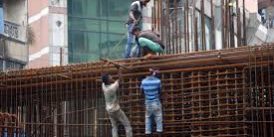Workplace accidents claimed the lives of as many as 257 workers across the country in the last six months, according to a report of the Safety and Rights Society.
The January-June period of 2019 saw a total of 210 such accidents, it said.
During the same period in 2018, some 352 people were killed in 285 workplace accidents. The casualty figure and the number of accidents for the same period in 2017 were 220 and 168 respectively.
The number of deaths in construction sector and from lightning strikes has declined, but the picture of others sectors and sub-sectors remains almost the same, according to the report.
Among the victims, 129 workers-the highest number-were killed in road accidents during January-June period and most of them were drivers, supervisors, and helpers.
The sector-wise deaths are as follows: 51 in construction sector; 37 in the service sector like hotels, workshops, power supply organisations; 33 in manufacturing sector like garment, rice mill, ship breaking, steel/re-rolling mill, brick fields; and seven in agriculture sector.
Falling machinery or heavy load or hard objects caused 31 deaths and some 21 workers electrocuted during the first half of 2019.
Experts, however, said both the number of incidents and deaths at workplaces declined during the period because the readymade garment sector followed the compliance.
They also suggested taking necessary steps to avoid such deaths.
One of the paramount agenda of the Sustainable Development Goals (SDGs) is to establish decent workplaces by ensuring safety of workers, they said.
They also stressed the need for adopting health and safety measures in workplaces in accordance with the Bangladesh Labour Act (Amended 2018) and Labour Rules 2015.
The report did not count the workers who died outside their workplaces or in road accidents on their way to or return from workplaces.
The report is prepared on the basis of newspaper reports collected from 26 dailies (15 national and 11 regional newspapers) between January 1 and June 30 of 2019.
Sekender Ali Mina, Executive Director of the Safety and Rights, said it is the failure of the authorities concerned to reduce the workplace deaths.
The actual number of deaths would be much higher as newspapers do not carry reports of all such deaths, he told the FE.
He stressed the need for greater efforts on the part of employers and owners to take measures to reduce the level of risks facing the workers.
Altaf Parvez, an independent researcher, told the FE that the figure of deaths is still very big.
The situation has improved in only RMG sector, but other sectors and sub-sectors remain out of the government monitoring with regard to compliance issue, he said.
The monitoring should be increased in all sectors and sub-sectors to curb workplace accidents, he added.
Farid Ahmed, Joint Inspector General (Safety) of DIFE, said the number of deaths in the RMG sector have declined, as the factory owners are trying to be complaint over the safety issues.
The DIFE have formed safety committees at the factories which help adopt structural, occupational and health safety measures to reduce the number of accidents, he told the FE.
Conducting fire drills have also contributed to reducing the number of incidents and deaths, he said.
The DIFE is providing training for workers and factory staffs to ensure their workplace safety, he added.
However, deaths in informal sectors and other sectors, excluding RMG, are still prevalent as the DIFE could not oversee them due to manpower shortage, said Mr Ahmed.
He also said the number of industrial units is growing day by day. So, it is very difficult to monitor them with inadequate number of staffs.







